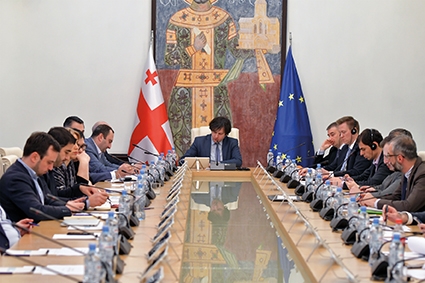NGOs Quit Working Group for Selection Criteria of Judges
Non-governmental organizations united under the Coalition for an Independent and Transparent Judiciary left the working group initiated by the Parliament Speaker of Georgia Irakli Kobakhidze. The group was created with the aim of designing selection procedures and criteria for Supreme Court judges.
The NGOs explain that the format did not serve as a means for discussing genuine legislative changes to ensure a merit-based approach to the selection process and its transparent and impartial conduct.
“The unequivocal position of the Speaker during the working meeting made it clear that he does not intend to come up with a draft that would preclude the unilateral nomination of Supreme Court judge candidates by the dominant clan of the judiciary. The Speaker’s position is a clear testament to his and the influential judges’ concerted action, hence making continued work in the offered format meaningless,’ the joint statement of the NGOs reads.
The issue became controversial after the High Council of Justice nominated 10 candidate judges for the Supreme Court of Georgia for life tenure. The list was rejected by the non-judge members of the HCOJ, NGOs and some members of the majority, who claimed that the presented judges had been working during the previous government and had the reputation of being “biased and corrupt.”
Parliament Speaker Irakli Kobakhidze said the discussions on the issue had been postponed until spring, adding a working group would be set up from the representatives of various sectors, which would define some additional criteria regarding the selection process of the judges.
Moreover, a group of MPs from the ruling Georgian Dream (GD) submitted a draft to Parliament, which envisaged suspension of the appointment of judges for lifetime tenure in the first and second instance courts. The initiative could not get enough votes and was not supported by the legislative body, after which four MPs quit the majority.
The NGOs believe that given the importance of the Supreme Court and its role in the judicial system, it is crucially important that the candidates be selected based on objective criteria and lengthy and transparent procedures.
The Coalition considers that prior to detailed discussion of the individual provisions of the draft bill, it is essential to reach an agreement on five key issues. They are:
1. Not only judges, but also other legal professionals including advocates, prosecutors and those who have passed the judicial qualification examination, should be allowed to participate in an open competition.
2. Those members of the HCOJ who participate in the competition should have their membership of the HCOJ suspended in order to eliminate the possibility of their involvement in the processes of candidate reviews and decision-making regarding themselves or other competitors.
3. The proposed draft contains a vague preliminary vote which may endanger the objective conduct of the competition and selection of the best candidates.
4. The draft requires decision-making by a 2/3 majority of the HCOJ, which does not ensure a chance for the non-judge members of the HCOJ to be involved in the process.
5. It is important that Parliament fully assess the accordance of the nominated candidates to the legislation and the Constitution, and for this purpose a working group should be created under the Legal Affairs Committee.
The NGOs claim that Kobakhidze rejects the notes presented by the non-governmental sector.
“The Parliamentary Speaker has a principled position regarding voting, and the formula he offers gives the dominant clan in the judiciary a full possibility to determine the nomination of specific candidates in the name of the HCOJ all by itself. This position again illustrates the Parliamentary Speaker’s and the ruling party’s unconditional support for the clan,” the statement reads.
Nazi Janezashvili, a non-judge member of the High Council of Justice, also noted that the project submitted by Kobakhidze does not guarantee that qualified staff from outside the Supreme Court can enter the system.
“Parliament should change the approach to the issue, so that highly qualified lawyers can claim the candidacy of Judge in the Supreme Court,” Janezashvili stressed.
After the last meeting of the working group, Kobakhidze made a brief comment that the ruling team is ready to discuss all the opinions expressed, except those which contradict the Constitution of Georgia and the Council of Europe standards.
By Thea Morrison
Image source: parliament.ge












